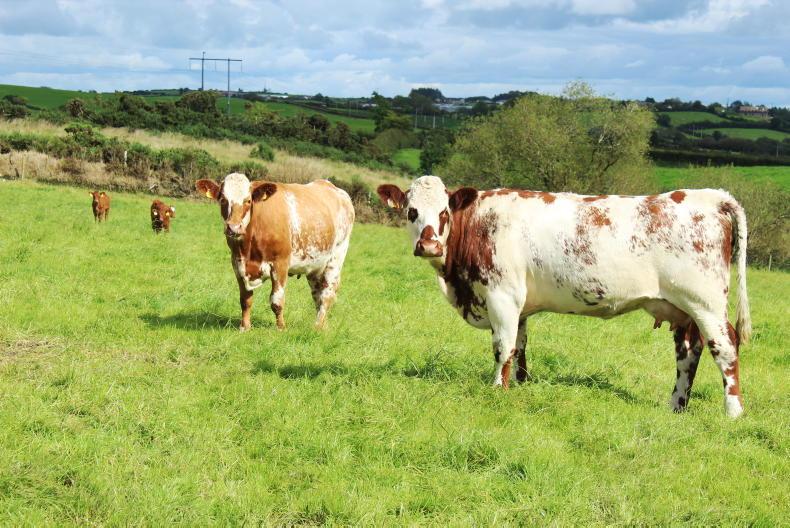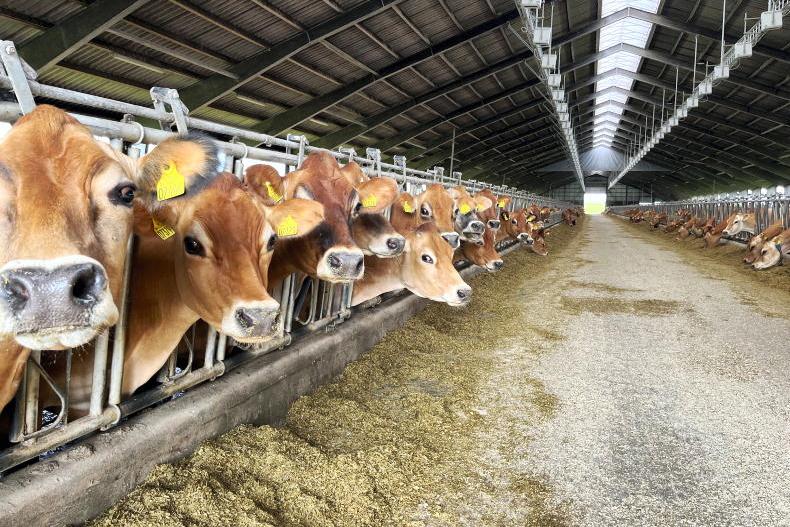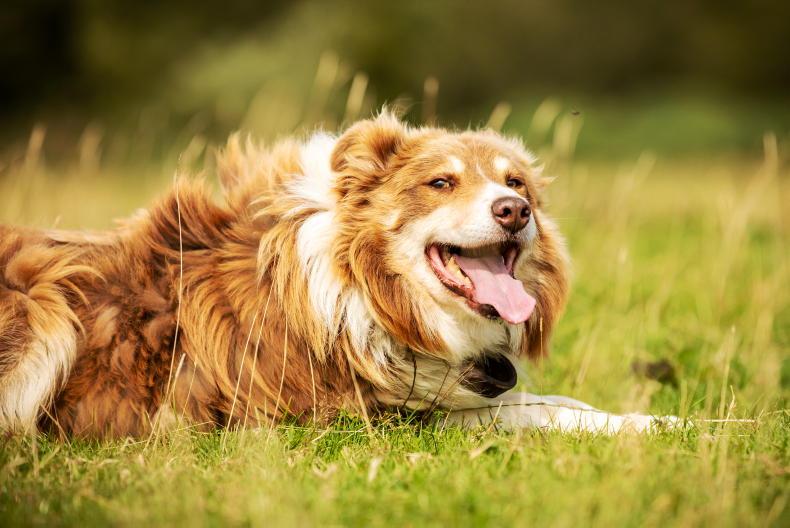The provisional findings of an independent impact analysis commissioned by the agri-food industry suggests that livestock numbers will have to be cut by up to 85% if NI is to achieve a target of net zero carbon emissions by 2045.
That target is set out in a private member’s bill taken forward by Green Party leader Clare Bailey, supported by the main political parties outside of the DUP, and currently being scrutinised by the Agriculture committee at Stormont.
The committee last Thursday heard from representatives from the NI Meat Exporters’ Association (NIMEA) and the NI Dairy Council.
On the basis of some provisional findings, in order to meet net zero, livestock numbers would likely need to fall by as much as 85%
Delivering a blunt assessment of the proposed legislation, NIMEA chief executive Conall Donnelly was critical of the lack of consultation with industry on the targets within the bill, and the failure to understand what impact it might have on rural communities.
“In the absence of an impact assessment we have commissioned one ourselves.
“On the basis of some provisional findings, in order to meet net zero, livestock numbers would likely need to fall by as much as 85%, based on currently available mitigation techniques,” Donnelly told MLAs.
Accountancy firm KPMG is understood to have been commissioned to undertake the work, although it is not yet complete, with more analysis still to be done around the impact of the bill on jobs and the wider rural economy.
Cottage industry
However, in his evidence, NI Dairy Council chief executive Dr Mike Johnson suggested that the NI dairy sector would end up as a cottage industry if the net zero target is adopted.
“The scale of the NI dairy sector would have to reduce to a level, the milk production output of which we last saw in 1946.
If you can send that clear message I think you will get a very positive response
“That’s why I say cottage industry – it would take us back to the future,” he said.
Johnson called for significant changes to the bill, pointing out that if amendments are made that address the concerns raised, it would be well received.
“If you can send that clear message I think you will get a very positive response. We want to get this right. We want to be involved, but give us a chance,” he said.
Not fit for purpose
During his evidence Johnson put it to committee members that a private member’s bill is not “fit for purpose” as a means of bringing forward important legislation, and it would not be entertained in health or education policy.
He also pointed out that the target in the DAERA bill for NI to reduce 2050 emissions by 82% compared to 1990 levels, should not be underestimated, and would require a reduction of around 20% in livestock numbers.
“Science will emerge, ways of measuring emissions will evolve, and 20% – we might be able to reduce that. We need to make sure that we can find ways to maintain our milk production with less animals,” he said.
Competitors ready to
take NI market share
A NI climate bill which sets a target for net zero emissions by 2045, and effectively forces farmers to drastically cut livestock numbers is seen as a major opportunity by competitors looking to displace NI in the UK market, warned NIMEA chief executive, Conall Donnelly.
The irony of all of this, for some of those other nations to reduce their carbon footprint, they should be importing from the British Isles
In their evidence, meat processor representatives highlighted that carbon emissions associated with western European livestock production are much lower than in other parts of the world, so it makes no sense to cut NI production and import beef from outside the EU.
“This would be a staggering outcome from a policy intended to reduce global emissions,” said Donnelly.
“That is just madness. The irony of all of this, for some of those other nations to reduce their carbon footprint, they should be importing from the British Isles,” added Dean Holroyd from ABP.
While it was an argument that found favour with the committee, Donnelly pointed out that the Assembly has no influence over UK trade policy, so instead it is vital that they make legislation that works for the agri-food sector and takes into account the evidence presented.
Science
The meat processor representatives also argued that the science behind how carbon emissions are measured continues to evolve.
As well as ongoing work to understand how much carbon is sequestered in grassland, trees and hedges, they pointed to research done by a number of eminent climate scientists which suggests that methane from ruminants should be treated differently to carbon dioxide released by fossil fuels.
A stable cattle and sheep population is effectively not contributing further to global warming
Methane is a potent greenhouse gas, but breaks down in the atmosphere after about 10 years, while carbon dioxide remains for centuries. As a result, a stable cattle and sheep population is effectively not contributing further to global warming.
“The risk is our industry is devastated on basis of policy driven by today’s carbon accounting principles, but these will change in the future. We could have done the damage by the time the measurement issue is resolved,” said Donnelly.
At this juncture the ROI have not debated the thorny topic of sectoral targets
Both he and Holroyd pointed out that there is a recognition of these issues within the government in the Republic of Ireland, which partly explains why there has been less of a focus on a potential cull of livestock.
“At this juncture the ROI have not debated the thorny topic of sectoral targets,” added Holroyd.
Efficient production can free up land
The beef and sheep sector can use inputs more efficiently, improve genetic gains, get more from grass, and slaughter livestock at younger ages, and all that will free up less productive land for re-wilding projects, biodiversity etc. Conall Donnelly told MLAs last Thursday.
“That is what increased productivity is all about,” he maintained.
However, it is a concept that some MLAs continue to fail to grasp, confusing increased productivity with more production.
Economic benefits
It was put to Donnelly by south Belfast MLA Clare Bailey that the agri-food industry has expanded in recent years, and the businesses he represents have “seen huge economic benefits from that”.
“Cattle numbers in NI are broadly the same they were in 1990, in fact they are 1% lower – sheep are 30% lower. We haven’t had an expansion in numbers,” he responded.
Technology to remove and store carbon
If the UK or other countries are to achieve net zero carbon emissions by 2050, they will need to invest in technology to both capture and store carbon, a leading climate scientist told MLAs on the Stormont Agriculture committee last Thursday.
Giving evidence, Professor Jon Gibbins from the UK Carbon Capture and Storage research centre outlined how there are two main methods of removing carbon.
The first is to remove it when burning the likes of biomass for energy production; the second is to take it directly from the atmosphere.
The carbon is then moved by pipeline to geological storage, such as porous rock, 1km down.
The climate will not know the difference
“It’s the sort of place that held oil or gas,” explained Gibbins.
“Getting to net zero is going to be very expensive,” he added.
Given that NI does not have a suitable storage site, it means that the technology should be cited in other parts of the UK.
“The climate will not know the difference,” said Gibbins.
He urged MLAs to take seriously the 82% target from the UK Climate Change Committee (CCC), pointing out that it was a reasonable target given that NI does not have the tools to store carbon.
The CCC advice to Agriculture Minister Edwin Poots is that NI cannot reach net zero without either a significant reduction in livestock numbers or a much greater than equitable share of carbon removal technology being located here.
Read more
Farmer Writes: UK-Australia deal has thrown us under the bus
Net zero target is morally wrong, MLAs told
The provisional findings of an independent impact analysis commissioned by the agri-food industry suggests that livestock numbers will have to be cut by up to 85% if NI is to achieve a target of net zero carbon emissions by 2045.
That target is set out in a private member’s bill taken forward by Green Party leader Clare Bailey, supported by the main political parties outside of the DUP, and currently being scrutinised by the Agriculture committee at Stormont.
The committee last Thursday heard from representatives from the NI Meat Exporters’ Association (NIMEA) and the NI Dairy Council.
On the basis of some provisional findings, in order to meet net zero, livestock numbers would likely need to fall by as much as 85%
Delivering a blunt assessment of the proposed legislation, NIMEA chief executive Conall Donnelly was critical of the lack of consultation with industry on the targets within the bill, and the failure to understand what impact it might have on rural communities.
“In the absence of an impact assessment we have commissioned one ourselves.
“On the basis of some provisional findings, in order to meet net zero, livestock numbers would likely need to fall by as much as 85%, based on currently available mitigation techniques,” Donnelly told MLAs.
Accountancy firm KPMG is understood to have been commissioned to undertake the work, although it is not yet complete, with more analysis still to be done around the impact of the bill on jobs and the wider rural economy.
Cottage industry
However, in his evidence, NI Dairy Council chief executive Dr Mike Johnson suggested that the NI dairy sector would end up as a cottage industry if the net zero target is adopted.
“The scale of the NI dairy sector would have to reduce to a level, the milk production output of which we last saw in 1946.
If you can send that clear message I think you will get a very positive response
“That’s why I say cottage industry – it would take us back to the future,” he said.
Johnson called for significant changes to the bill, pointing out that if amendments are made that address the concerns raised, it would be well received.
“If you can send that clear message I think you will get a very positive response. We want to get this right. We want to be involved, but give us a chance,” he said.
Not fit for purpose
During his evidence Johnson put it to committee members that a private member’s bill is not “fit for purpose” as a means of bringing forward important legislation, and it would not be entertained in health or education policy.
He also pointed out that the target in the DAERA bill for NI to reduce 2050 emissions by 82% compared to 1990 levels, should not be underestimated, and would require a reduction of around 20% in livestock numbers.
“Science will emerge, ways of measuring emissions will evolve, and 20% – we might be able to reduce that. We need to make sure that we can find ways to maintain our milk production with less animals,” he said.
Competitors ready to
take NI market share
A NI climate bill which sets a target for net zero emissions by 2045, and effectively forces farmers to drastically cut livestock numbers is seen as a major opportunity by competitors looking to displace NI in the UK market, warned NIMEA chief executive, Conall Donnelly.
The irony of all of this, for some of those other nations to reduce their carbon footprint, they should be importing from the British Isles
In their evidence, meat processor representatives highlighted that carbon emissions associated with western European livestock production are much lower than in other parts of the world, so it makes no sense to cut NI production and import beef from outside the EU.
“This would be a staggering outcome from a policy intended to reduce global emissions,” said Donnelly.
“That is just madness. The irony of all of this, for some of those other nations to reduce their carbon footprint, they should be importing from the British Isles,” added Dean Holroyd from ABP.
While it was an argument that found favour with the committee, Donnelly pointed out that the Assembly has no influence over UK trade policy, so instead it is vital that they make legislation that works for the agri-food sector and takes into account the evidence presented.
Science
The meat processor representatives also argued that the science behind how carbon emissions are measured continues to evolve.
As well as ongoing work to understand how much carbon is sequestered in grassland, trees and hedges, they pointed to research done by a number of eminent climate scientists which suggests that methane from ruminants should be treated differently to carbon dioxide released by fossil fuels.
A stable cattle and sheep population is effectively not contributing further to global warming
Methane is a potent greenhouse gas, but breaks down in the atmosphere after about 10 years, while carbon dioxide remains for centuries. As a result, a stable cattle and sheep population is effectively not contributing further to global warming.
“The risk is our industry is devastated on basis of policy driven by today’s carbon accounting principles, but these will change in the future. We could have done the damage by the time the measurement issue is resolved,” said Donnelly.
At this juncture the ROI have not debated the thorny topic of sectoral targets
Both he and Holroyd pointed out that there is a recognition of these issues within the government in the Republic of Ireland, which partly explains why there has been less of a focus on a potential cull of livestock.
“At this juncture the ROI have not debated the thorny topic of sectoral targets,” added Holroyd.
Efficient production can free up land
The beef and sheep sector can use inputs more efficiently, improve genetic gains, get more from grass, and slaughter livestock at younger ages, and all that will free up less productive land for re-wilding projects, biodiversity etc. Conall Donnelly told MLAs last Thursday.
“That is what increased productivity is all about,” he maintained.
However, it is a concept that some MLAs continue to fail to grasp, confusing increased productivity with more production.
Economic benefits
It was put to Donnelly by south Belfast MLA Clare Bailey that the agri-food industry has expanded in recent years, and the businesses he represents have “seen huge economic benefits from that”.
“Cattle numbers in NI are broadly the same they were in 1990, in fact they are 1% lower – sheep are 30% lower. We haven’t had an expansion in numbers,” he responded.
Technology to remove and store carbon
If the UK or other countries are to achieve net zero carbon emissions by 2050, they will need to invest in technology to both capture and store carbon, a leading climate scientist told MLAs on the Stormont Agriculture committee last Thursday.
Giving evidence, Professor Jon Gibbins from the UK Carbon Capture and Storage research centre outlined how there are two main methods of removing carbon.
The first is to remove it when burning the likes of biomass for energy production; the second is to take it directly from the atmosphere.
The carbon is then moved by pipeline to geological storage, such as porous rock, 1km down.
The climate will not know the difference
“It’s the sort of place that held oil or gas,” explained Gibbins.
“Getting to net zero is going to be very expensive,” he added.
Given that NI does not have a suitable storage site, it means that the technology should be cited in other parts of the UK.
“The climate will not know the difference,” said Gibbins.
He urged MLAs to take seriously the 82% target from the UK Climate Change Committee (CCC), pointing out that it was a reasonable target given that NI does not have the tools to store carbon.
The CCC advice to Agriculture Minister Edwin Poots is that NI cannot reach net zero without either a significant reduction in livestock numbers or a much greater than equitable share of carbon removal technology being located here.
Read more
Farmer Writes: UK-Australia deal has thrown us under the bus
Net zero target is morally wrong, MLAs told









SHARING OPTIONS